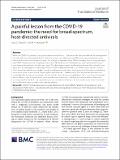A painful lesson from the COVID-19 pandemic: the need for broad-spectrum, host-directed antivirals
Author(s)
Chitalia, Vipul C.; Munawar, Ali H
Download12967_2020_Article_2476.pdf (906.6Kb)
Publisher with Creative Commons License
Publisher with Creative Commons License
Creative Commons Attribution
Terms of use
Metadata
Show full item recordAbstract
While the COVID-19 pandemic has spurred intense research and collaborative discovery worldwide, the development of a safe, effective, and targeted antiviral from the ground up is time intensive. Therefore, most antiviral discovery efforts are focused on the re-purposing of clinical stage or approved drugs. While emerging data on drugs undergoing COVID-19 repurpose are intriguing, there is an undeniable need to develop broad-spectrum antivirals to prevent future viral pandemics of unknown origin. The ideal drug to curtail rapid viral spread would be a broad-acting agent with activity against a wide range of viruses. Such a drug would work by modulating host-proteins that are often shared by multiple virus families thereby enabling preemptive drug development and therefore rapid deployment at the onset of an outbreak. Targeting host-pathways and cellular proteins that are hijacked by viruses can potentially offer broad-spectrum targets for the development of future antiviral drugs. Such host-directed antivirals are also likely to offer a higher barrier to the development and selection of drug resistant mutations. Given that most approved antivirals do not target host-proteins, we reinforce the need for the development of such antivirals that can be used in pre- and post-exposure populations.
Date issued
2020-10Department
Massachusetts Institute of Technology. Institute for Medical Engineering & Science; Harvard University--MIT Division of Health Sciences and TechnologyJournal
Journal of Translational Medicine
Publisher
BioMed Central
Citation
Chitalia, Vipul C. and Ali H. Munawar. "A painful lesson from the COVID-19 pandemic: the need for broad-spectrum, host-directed antivirals." Journal of Translational Medicine 18, 1 (October 2020): 390 © 2020 Springer Nature
Version: Final published version
ISSN
1479-5876